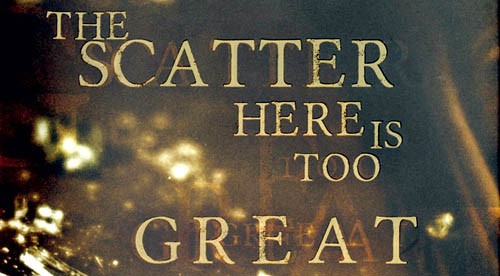

Novels often struggle with their beginnings. It takes about six seven pages to introduce things -- characters, theme, locale, whatever. Just letting the readers familiarise with what to expect in the pages to come. Not so in The Scatter Here is Too Great. The reader is with the narrator from the word go. There could not have been a better start to a novel.
It’s not just the strength of content. You relish the use of language which is so original: everyone at school calling the boy "parrot, parrot" because of his protruding teeth; his anger leading to a fight with a boy and ending up saying "sorry sorry" to his Baba. With sentences beginning with arrey and abbey the language is endearing, so close to your own, you want to read it all.
Soon you get to read about the most powerful metaphor -- that of a blackboard and a kid. An imaginary blackboard, where the father-son draw their moods and, when they are not sharing thoughts, guess what the other may have drawn. So when the father loses his job, the son felt as if "Baba was drawing a night on his blackboard; a night with a lot of rain and the wet lights of cars, but no sun". Sun was often there before.
Yet Bilal Tanweer, in his debut novel, does not want the reader to sit back and enjoy a linear progression of narrative. He breaks it and keeps doing it till the end. There are three sets of stories that are obviously connected. But he leaves one in the middle to move to the second, stays there for some time, moves back to the first before going on to the third and again back to the first one. That makes the reader slightly confused but without losing interest in the "breathtaking stories".
And these are all told in the streets, in apartments, from rooftops, and most of all in buses. This could only have been one city -- Karachi. The novel begins and ends in the city while the writer may have been moving across continents and cities himself. Being a Karachi book, it would obviously have crime and violence but it also has shades of kindness, love, youthful attractions, comrades, their irrelevance and much more.
The book is being celebrated more for its treatment of violence by the privileged few who have read it. But that’s for a reason. In the very beginning, the man (Baba) loses his job just because his boss was shot while coming out of a bank, carrying money. Soon after, there are thieves in the bus. Violence is kind of weaved in with the entire narrative in both latent and real manner.
The entire action revolves around one bomb blast that has taken place "at a station in the heart of the city". It’s interesting to see how various characters are variously affected by and respond to this blast. In at least one case, the writer makes us come really close to the scene of the blast where an ambulance driver, a young man of nineteen, just could not come to terms with death in this manner and loses his mind.
Two incidents are striking -- the two strange men at the site in pink cloaks who were like rats and picked something from the rubble, and a brother narrating the story of his soldier brother who lost his body down from the chest. They take you to the realm of magic realism and draw interesting parallels with Salman Rushdie’s world. Here these incidents appear towards the end of the novel, perhaps to coincide with the characters’ response to violence.
The writer in the novel speaks the author’s mind when he says, "Living in the city, you developed a certain relationship with violence and news of violence: you expected it, dreaded it, and then when it happened, you worked hard to look away from it, because there was nothing you could do about it -- not even grieve, because you knew that it would happen again and maybe in a way that was worse than before… This city was full of bottled-up grief."
There are more than one characters who act as writers in the novel; all doing different sorts of writing. Through them Bilal Tanweer explores his own dilemmas including what purpose should writing serve and what happens to writing itself when you sit down to write. One character trying to write an autobiography, largely for his son, speaks for all of us when he says: "That was the strange problem with writing, you had discovered. Meaning never matched the words and words always evaded the thought… You had clear ideas. But what finally made onto paper was circular and loopy and joined at the wrong ends with everything else…"
Bilal appears to have resolved this dilemma quite successfully in The Scatter… It would be unfair to categorise the book as a Karachi book or a book on violence or human relationships or one that makes excellent use of literary metaphors, for it is all of this and much more.
The book is available at Readings, Lahore, which is its sole distributor.